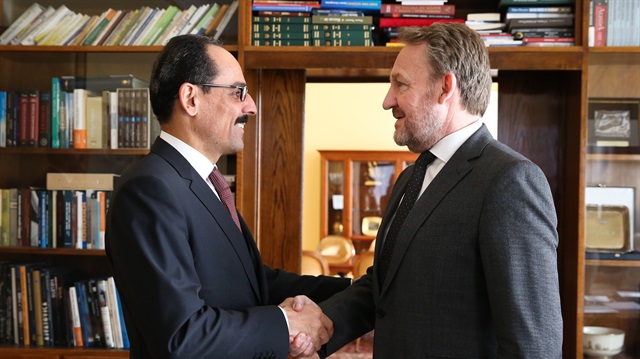
If we can maintain balance between unity and diversity, we can prevent unnecessary wars, says Ibrahim Kalın
Kalın's remarks came during a visit to Bosnia and Herzegovina's capital Sarajevo, where he gave a lecture entitled "Islam-West Relations in the 21st Century" at the Faculty of Political Sciences at the University of Sarajevo.
Kalin addressed what he saw as the general patterns of perception about Islam and Muslims.
"When a Muslim person produces something beautiful, it must have been taken from another place, and according to their view, Muslims do not have their own intelligence, capacity, and this work has been taken from Christian art, Jewish art, African art or Indian art.
“This is a wrong perception and pattern of thinking. The Muslim countries are not the richest countries in the world. These countries do not have the biggest armies in the world. They do not produce weapons of mass destruction. The Muslim countries do not have the most advanced military technology but somehow, Muslims are represented every day as the greatest threat," said Kalin.
Kalin said Western nations were mostly responsible for this characterization.
"They have the largest armies in the world, they control the world economy, there are weapons of mass destruction, atomic bombs and chemical weapons, that is the difference between perspective and reality," said Kalın.
'Prevent unnecessary wars'
Kalın said that there is an extraordinary diversity that Allah has created from color to race, ethnicity to cultures, ideas and perspectives.
"We can prevent unnecessary wars if we can maintain the balance between unity and diversity," said Kalın.
Kalin said Islam and Western societies did not have to be in conflict with each other and could learn from each other.
He added that Sarajevo could serve as a model in this sense.
"This is what I feel at least when I come to Sarajevo, I hope it will be more real than a dream," said Kalin.
Kalin also attended a panel on "The Future of Islam and Muslims in Europe on the Axis of Andalusia and Bosnia-Herzegovina" organized by the International University of Sarajevo.
Speaking at the panel, Kalın addressed the genocidal attack in Srebrenica perpetrated by Bosnian Serb forces, in which more than 8,000 Muslims were murdered.
"If Bosnian Muslims can still honorably remain as part of Europe 20 years after the Srebrenica genocide, it means there is still a hope. We need to help them as Europeans, Turks or others to establish a new Andalus in Bosnia and Herzegovina," said Kalin.
Andalusia on the Iberian Peninsula was under the influence of the Arabs between 711-1492. It is also known as Muslim Spain. Al-Andalus was a medieval Muslim territory considered tolerant where also lived Jews and Christians as well as a large Slavic population.
The Bosniak member of the Presidency of Bosnia and Herzegovina Bakir Izetbegovic underlined that Islamic thought has initiated a humanitarian revival of Europe, and neither Islam nor Muslims are foreign to the spirit of Europe.
"Muslims, along with other societies, built Europe and they are the natives of European culture and civilization," said Izetbegovic.
Later in the day, the Turkish Presidential spokesman met with journalists in the capital Sarajevo.
Kalin talked about Turkey’s Operation Olive Branch in Afrin, Syria, which began last Saturday.
He said that Turkey launched the operation to protect its borders as well as Syria’s territorial integrity.
The Turkish presidential aide said that the operation would continue until the whole region was cleared from terrorist elements and it did not target Kurdish people.
According to the military, the operation aims to establish security and stability along Turkish borders and the region as well as protect Syrians from terrorist oppression and cruelty.
The operation is being carried out under the framework of Turkey's rights based on international law, UN Security Council resolutions, its self-defense rights under the UN charter, and respect for Syria's territorial integrity, it said.
The military also said it is putting the "utmost importance" on not harming any civilians.
Afrin has been a major hideout for the PYD/PKK since July 2012, when the Assad regime in Syria left the city to the terror group without putting up a fight.
Hello, the comments you share on our site are a valuable resource for other users. Please respect other users and different opinions. Do not use rude, offensive, derogatory, or discriminatory language.
The floor is all yours.











